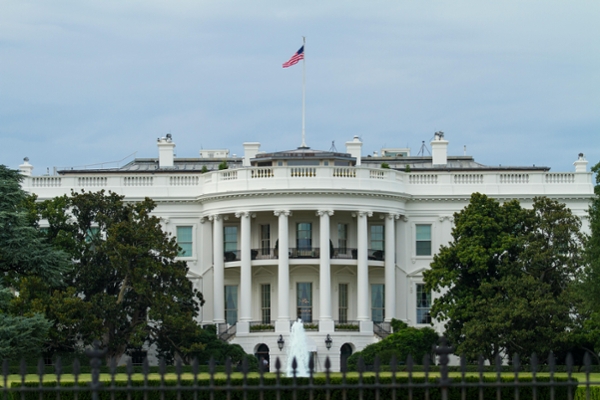
The need for a new approach to Canada-U.S. Diplomacy
Canada’s relationship with the U.S. is complex, asymmetrical, and fundamental to Canada’s economic prosperity. It is also entering a period of great uncertainty that requires a fundamental rethinking of Canada’s diplomatic engagement with the U.S.
By George Haynal, Former ADM, The Americas; Consul General, New York; Global Affairs CanadaIntroduction
Download the Discussion Questions
The U.S.-Canada relationship is as complex and rich as it is asymmetrical. While mutually beneficial, it is of disproportionate importance to Canada. It has therefore been Canada’s core foreign policy objective to sustain it as much as possible on our terms, i.e. ensure access to the U.S. economy, enjoy the protection of U.S. investment in continental security, and at the same time contain American incursions on our sovereignty.
Given the disproportionate size of the partners it is also an unusually close and respectful relationship. What makes this possible is that both the United States and Canada are successor states to British North America, and in that, share common approaches to the rule of law, individual rights, accountability in governance, language and (within limits) culture. By way of contrast, the United States and Mexico share little by way of historic affinities; rather, their relationship over time has been fraught by conflict.
Our relationship with the United States has enriched both economies. Canada has provided the United States with a stable, mature and secure open market within reach by rail and road as well as a dependable northern border for security. For Canada, the United States had become the “planet economy” around which we gravitate. We enjoy its protection and profit from partnering in its markets.
In a global economy, it can be credibly argued that one of Canada’s most important comparative advantages among nations is its proximity and access to the U.S. which remains the world’s economic powerhouse.
It is a complex relationship for Canada to manage because we have to do the heavy lifting. The United States has been, until now, largely passive in its approach. In fact, responsibity for the relationship in the State Department has moved from time to time between the office responsible for Europe and that in charge of Latin America. The reason is that the stakes are far higher for us than for the U.S.
Canadian Governments are constantly challenged to protect our sovereignty while sharing in the management of integrated economies, safeguarding a common physical environment, and protecting the security of the North American continent.
How We Do It?
Management of the relationship involves domestic and foreign policy making, not just dealing with cross-border issues. Policy makers are obliged to be sensitive to the impact on the relationship of decisions regarding how we manage our own affairs, and the degree to which we are or are not helpful to the United States on the international stage.
Despite its centrality in Canadian life, the relationship has a relatively low and localized impact in the United States, and means that Canada has not been a focus of U.S. political interest. This largely benevolent neglect in the U.S. political system has, in turn, been key to keeping the relationship pragmatic and stable, (though it has occasionally allowed special interests, such as the U.S. lumber industry, to challenge our access to U.S. markets).
Our U.S. diplomacy has, therefore been dedicated to keeping the relationship workmanlike, under the political radar, but ready to head off protectionist threats. While engaging actively with the U.S. Administration to manage irritants and shared issues, our diplomacy has also sought to ensure benevolent neglect in the U.S. political system through active outreach to Congress. Maintaining good relations at the summit of governments have always been an important part of our diplomacy. They helped ensure that successive Administrations were as responsive as possible to our interests, and to defend the relationship against special interests in Congress. Summit diplomacy was used only rarely, for agenda setting and crisis management.
So much for the past. What now?
Over seventy years, Canada’s interests have been well served by ensuring that our cross-border relations remained boringly free of conflict.
But now, the Trump ascendancy has transformed the relationship. It is no longer special and quiet. For the first time in more than a century, Canada’s continued sovereignty has been put in question.
President Trump has shredded the trade and defence agreements established to protect our economic and security interests. The neighbourly approach to managing the border is a victim of his trade and migration policies. Nor is our role as a trusted international ally of much help as the Administration has lost interest in its historic role of leading the Western alliance and has turned inward. We have become Trump’s “near abroad”, dependent, in his eyes, for our survival on serving America’s interests in North America and following its lead in a lockstep manner internationally.
In short, our long-standing U.S. diplomacy has become obsolete. We can no longer rely on U.S. Administrations to help smooth political attacks on the relationship because it is now the Administration itself that is the aggressor. Nor can we assume that Congress is a potential ally in defending the partnership.
Rather than a largely elite-focussed diplomacy, relying on inertia and good will at the top of the U.S. political system to protect an equitable relationship, we must expand our focus. That means building a “populist” diplomacy, aimed at ensuring broad, grassroots, popular support to help us shape the political environment in our favour.
The first step is to define what want and what we do not want in the relationship. Diplomacy can only be effective if it is a clear expression of objectives.
The lack of well-defined, strategic “Team Canada” objectives has not been a serious problem while the relationship was safely out of the way of fire in U.S. politics. But that is no longer the case. Now, a lack of a clear and detailed set of goals and red lines agreed to among all Canadian governments is essential to making our diplomacy effective. Issues that we had not seriously had to consider in the past are now front and centre. Five possible challenges stand out:
Potential U.S. demands include: a customs union, a much higher level of priority and expenditure on continental defence, tied to U.S. procurement; privileged access to our natural resources, including water; corporate participation in our social programmes, particularly the delivery of health care; elimination of subsidy regimes in manufacturing and agriculture; harmonization of regulatory regimes, including in energy and environmental protection.
Then of course, there is the President’s obsessive talk about merger with the United States, to which the Prime Minister has already given a resounding “No”, as he clearly stated when he and Trump met in the Oval Office.
Defining our response to these demands will require strong leadership from the top.
Getting our act together: The Centre must be in charge
Direction of Canadian diplomacy in the United States is now in many hands: the Ambassador in Washington, the Minister of Global Affairs, a multitude of Cabinet Ministers all of whom have responsibility for issues involved in the relationship, the Provincial Premiers, regulatory agencies and ultimately, the Prime Minister. This ramshackle approach must be regularized if we are to survive.
The responsibility for coordinating all aspects of U.S. related policy should be placed squarely in the Privy Council Office, the central agency directly responsible to the Prime Minister. This Secretariat should mirror the expertise deployed to the Embassy in Washington, with which it should form a single policy clearing house for U.S. relations. The Prime Minister should be the Minister in charge, as he is of Federal Provincial relations.
To ensure effective planning and execution of U.S. related policies, the Ambassador in Washington should be made a permanent member of the Cabinet as there is virtually no policy issue raised to Cabinet that does not in one way or other, impact on the relationship. Moreover, all Memoranda to Cabinet should include a “U.S. Relations implications” section similar to that which now covers Federal Provincial relations.
The role of Global Affairs Canada
This carve out of U.S. relations raises the question of what Global Affairs Canada (GAC) could have done better and what its role will be the new Canada-U.S. relations framework.
As its name implies, GAC is spread very thin. It is in charge of conducting relations with a multitude of countries and multilateral institutions, delivering consular services to Canadians abroad, managing Canada’s development assistance programme, and international trade policy and promotion.
Management of U.S. relations is one responsibility among many, and it is one where many actors across government have expertise and lead responsibility. When I had a modest role in U.S. relations at GAC, I tried to come to grips with the fact that a foreign ministry should not even try to monopolize management of this existential and complex relationship. Rather it should try to make it coherent. I sought to engage the interdepartmental community with the concept that we shared an “intermestic relationship”, with the United States, one that involved not just engagement on the international level as allies and partners in global institutions, but also the conduct of cross border issues, the ongoing management of domestic affairs, where the interests of the United States were always, in one way or another, either engaged or potentially affected.
Rather than departments fighting for turf, I believed it was most effective to manage it as much as possible on a coordinated basis across government, with GAC in a convening role. Needless to say, I failed. No ministry, with the possible exception of Finance has the power to convene and coordinate across the government system. The only agency with the power to do so is the Privy Council Office, and until the Trump insurgency the only time that the PCO took such a role was in the wake of 9/11.
The situation, even through Trump’s first term, continued as before. Every department managed its own issues, with GAC playing an administrative role in the U.S. and leading on negotiations on the USMCA, as part of updating NAFTA.
Even with the PCO being in charge of policy coordination, GAC would still have a critical role in management of U.S. relations. It would include working with the United States in multilateral fora and foreign capitals, administration and staffing of diplomatic posts in the United States, trade and investment promotion in the United States. Other responsibilities as may be provided for in the “whole of government” framework would all fall logically to GAC. The foreign ministry will also have to play a critical role in reshaping our global diplomacy to reflect the new world by reconsidering priorities that would allow us to have influence with the United States while adhering to our core values. This will be its primary challenge for the foreseeable future.
Our representation on the ground must also be adjusted to reflect the new environment. It should be expanded, upgraded and, importantly, become an effective presence on the Cloud.
Going local
The Embassy in Washington will always remain critical to both policy formation and issue management.
That said, former U.S. House Speaker Tip O’Neill’s dictum that “all politics is local” still holds up pretty well despite the cult-like nature of the Republican party today. To take advantage of that diversity of interests across the US, we must deploy far more resources in ‘going local’ reaching out to national and state political leaders where they and their constituents live and to whom they are accountable, far from the Washington Beltway.
The most effective first step in doing so would be to extend our network of 14 consulates across the country, and give them the human and financial resources they need to engage leaders on their home ground.
Consulates in the United States are now largely at the service of Canadian business, promoting trade and investment. They also assist Canadians with local authorities. They are also there to help promote the Canadian “brand” and, when called on, to intervene on cross-border issues with the local authorities and federal players. If the right people are at post they have been effective in this role, but engaging with national leaders on their home ground has been just one of their priorities. Even if it were their first task, 14 Consuls General and their small staffs could not develop working relations with 100 Senators and the 435 Members of the House or their staffs at home. It is urgent that the capacity in the field be extended to meet the challenge.
By way of contrast to our 14 consulates, Mexico has 55 across the United States. We may not need that many, but we definitely need more than 14. We need it in critical economic nodes across the United States, and we need it staffed by skilled communicators whose key mission is to build networks that influence political leaders at the state and Federal level. Provincial participation at the various consulates that are of special interest to them should be part of the Canadian presence where their interests are most engaged.
Cyber diplomacy
To catch up with the social media world, we must make Cyber diplomacy a priority for innovation in the United States. We need to go viral with messages to critical communities and stakeholders that Canada matters to them. Messages that Americans understand on platforms that they frequent would extend the reach of what is now still essentially a physical presence in the United States.
There are a variety of ways to take our cyber presence to the next level.
The Government could establish a virtual “influencer corps” of young professionals adept at getting eyeballs on social media to help define and diffuse the Canadian “brand” on key U.S. platforms. The government could also advertise on influential social media sites, even those not otherwise favourable to our interests. Canadian celebrities could be mobilized to sell the Canada brand. An active and engaging social media presence by the Prime Minister and other Canadian leaders could stimulate interest in and support for Canada’s independent role in North America. A good example of the power of social media was Premier Ford’s intervention on the U.S. tariffs and Canada as a 51st state issues which went viral when he spoke out.
Indirect political engagement: A Canada PAC
There are more than three million Americans with Canadian backgrounds and connections with our country. There are also a multitude of U.S. economic actors with a deep interest in maintaining a harmonious U.S. Canada relationship.
Canadians can go beyond shopping boycotts and engage in managing the relationship by encouraging those Americans with a direct interest in Canada to follow the example of other expatriate communities and form Political Action Committees. PAC’s could support political leaders sympathetic to Canada, organize events and stimulate discourse that would exert pressure on the political system to support Canadian interests. The American Israel Political Action Committee (AIPAC) provides an example of a highly successful effort of this kind, but it is not the only one. Mexico has the Mexican American Political Association to advocate for it in the U.S. political system.
Domestic support for our US diplomacy: The North America Centre
Until the Trump shock, Canadians, including in the business community, took the U.S. relationship for granted and had little familiarity with the complexities of the American system or the challenges of managing it. We can no longer afford not to understand America and the true dynamics of our relationship with it.
We have no single institution capable of playing this role. We fail to measure up among similarly sophisticated international players, which actively support such institutions. A good example is the Mexican Institute of International Affairs. Like other foreign affairs institutes it serves to broaden their nation’s capacity to understand and manage their most important relationships, conditioning public attitudes to deal with complex realities with which governments must deal. With the demise of the Canada Institute at the Wilson Centre in Washington, a victim of Trump spending cuts, there is an opportunity for Canada to fill the gap by forming a similar institute focused on Canada-U.S. relations.
The political decisions involved in managing the U.S. relationship will often be difficult and require political will. The Government could help political leaders to generate that political will by building a more sophisticated understanding of the American realities among Canadians. It should establish a North America Centre to help provide expert advice and data for decision makers in governments and business. It would teach and train future leaders to manage affairs in the U.S, and across the border, establish a virtual public library on all aspects of U.S. society, provide a forum for the discourse on our relationship, and create a credible bridge to the world of U.S. think tanks that play a critical role in American policy making.
A previous government established such a centre focussed on the Asia Pacific region. It would make eminent sense to invest in such an institution to help manage Canada’s existential relationship with the United States.
Crises make room for innovation. Canada faces the greatest external threat in its history. We need innovation on many fronts to address it, including in our diplomacy.
George Haynal

George Haynal was a career Foreign Service Officer for the Government of Canada. He had, among other roles, been Head of the DFAIT Policy Planning Staff, Director of Operations in the Priorities and Planning Staff of the Privy Council Office, ADM for the Americas, and Consul General in New York. He is a Senior Fellow at the Munk School of Global and Public Affairs at the University of Toronto.


